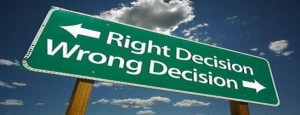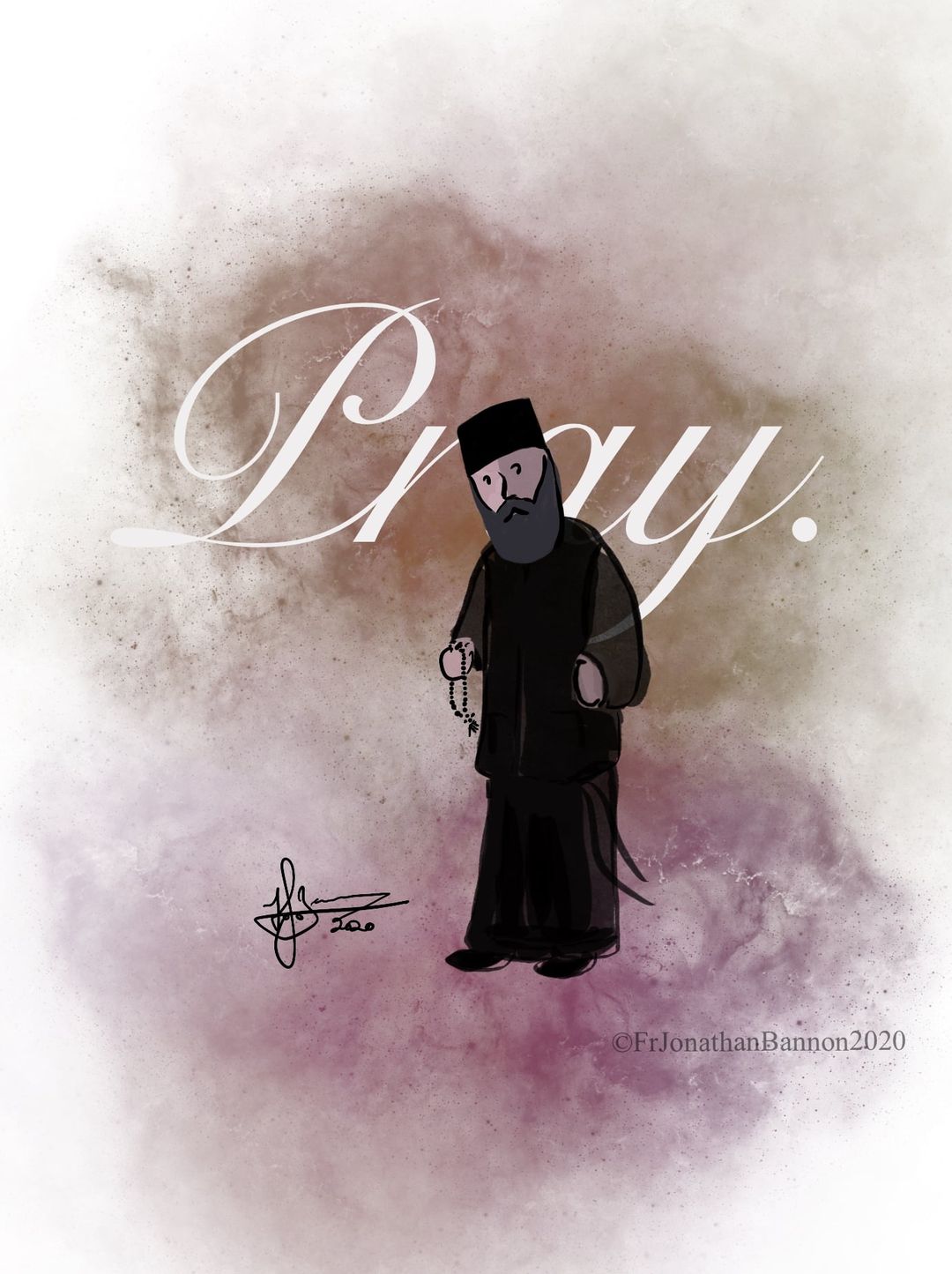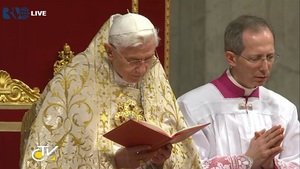Conscience demands uncompromising honesty, and that is why it is an integral component of authentic prayer. When we consciously enter the presence of God, it is imperative that we do so as we are, and not with a persona. This means being alert to any sort of self-deception we may bring to prayer, because God desires to meet us as we are. God is not interested in relating with a phantom, a phony, with a persona that has no real existence, which is only trying to cover up what we are afraid to face. To stand before God in our conscience and say, “Here I am” puts us in a position to have a true encounter with the Living God. This is the stuff of transformation. (NS)
Tag: conscience
Electing new government
The Democratic National Convention just finished and Republicans had their jamboree the week before last. I am finding it difficult to settle on the right candidate for governance of these American States. Neither of them, in my opinion, are right for high office. While I am not going to outline right now why I think so, I am merely offering my reservation for both political candidates.
What do I have to do to able to vote with an informed conscience? Is there a primacy of conscience? At this time, a good sense of one’s moral compass, the desire for the good of all, one can say that making a decision for a political candidate (party) today is not easily made or clearly or satisfying. Political elections is not supposed to be rooted in ideology but in solid principles based on Christian ethics (here I am speaking as a Catholic but there same would be said of people faith and good will applicable to all people) and Catholic Social Teaching. Using what the US bishops said, I have “the responsibility to make choices in political life [that] rests with each individual in light of a properly formed conscience” (FCFC, 37). Herein lies the hard and necessary work. In his 1993 document, Veritatis Splendor, John Paul taught that a human being “must act in accordance with [the judgement of conscience]. If man acts against this judgment or, in a case where he lacks certainty about the rightness and goodness of a determined act, still performs that act, he stands condemned by his own conscience, the proximate norm of personal morality” (60). This idea comes from the Thomistic tradition that says if one ignores the conscience one ignores God (even if the conscience is in error).
What is conscience? Among many things that can be said about conscience the teaching of the Church is that conscience is not a mechanism for one’s rationalization of one’s subjectivity, allowing for a person to do what he or she wants at will without the guidance of objective norms of the moral life. Conscience is relational to the objectivity of truth; the notion that there is my t truth and your truth is to retreat for truth because truth is not reduced to this type of certainty. One ought to consider what the Council Fathers taught about conscience they described it as “the voice of God resounding in the human heart, revealing the truth to us and calling us to do what is good while shining what is evil.” Moreover, “conscience is a judgment of reason whereby the human person recognizes the moral quality of a concrete act that he is going to perform, is in the process of performing, or has already completed.” Hence, we say conscience is basic to the person who seeks to know and do what is good and true based on a process of discernment and moral reasoning. The primacy of conscience is rooted in a sense of the truth first and foremost. This notion of primacy led Blessed John Henry Newman to say in this regard that “Certainly, if I am obliged to bring religion into after-dinner toasts… I shall drink –to the Pope, if you please, — still to Conscience first, and to the Pope afterwards.” The Authority of the pope and primacy of conscience are not in opposition to each other because both seek to know the truth: no conscience without the truth.
A conscience can err in its “[i]gnorance of Christ and his gospel, bad example given by others, enslavement to one’s passions, assertion of a mistaken notion of autonomy of conscience, rejection of the church’s authority and her teaching, [and] a lack of conversion and charity.” (FCFC 400).
But back to what is crucial: to keep in mind what promotes the dignity of the human person based on a well formed conscience as the guide for making a decision on a political candidate. The faithful, then, in the formation of conscience “ought carefully to attend to” church teaching with an openness of mind and heart regarding the reasons of thus-and-such moral point with the work of seeking and adhering to the truth; Thus, we ultimately are called upon submitting one’s reason and will with sincerity. Here we acknowledge the Church is a most reliable in the formation of conscience.
Areas of concern for the flourishing of human dignity:
- concerns for the family as “the first and fundamental unit of society”;
- principles for sacredness of life in the face of evils like abortion, euthanasia, IVF;
- just war teaching in both its jus ad bellum (when nations may go to war) and jus in bello (how war must be conducted) –even with the complexities of modern warfare;
- principles of subsidiarity and solidarity –the social security and welfare programs;
- a moral mandate of a just wage; the rights—and obligations—of workers generally;
- just immigration policies;
- rights of economic freedom/initiative and private property;
- support for good agricultural;
- support for good environmental stewardship;
- rights to health care and education; fighting unjust discrimination;
- a preferential option for the poor, elderly and chronically ill;
- and, a reasonable consideration for international debt relief of poor nations.
One help is the concept that the US bishops place on the table: “When all candidates hold a position that promotes an intrinsically evil act, the conscientious voter faces a dilemma. The voter may decide to take the extraordinary step of not voting for any candidate or, after careful deliberation, may decide to vote for the candidate deemed less likely to advance such a morally flawed position and more likely to pursue other authentic human goods” (FCFC, 36)
Some essays and resources to read:
Forming Consciences for Faithful Citizenship (2007; updated by the US bishops)
“Can a Catholic in good conscience vote for Trump?”
“Why I Must Oppose Donald Trump: One Priest’s Perspective”
a bibliography stitched by the UND
and consult with Joseph Ratzinger’s Conscience and Truth
Conscience is the window to truth
 In the 10th grade Confirmation class that I teach the question of Conscience and its formation was the topic of conversation the other day. Most of the students knew nothing about conscience, why it was important to inform and to form and how it functions in making good decisions.
In the 10th grade Confirmation class that I teach the question of Conscience and its formation was the topic of conversation the other day. Most of the students knew nothing about conscience, why it was important to inform and to form and how it functions in making good decisions.
One of the things the ecclesial movement of Communion and Liberation has reminded me that ethics (conscience) never comes before the event of the Incarnation. Conscience is first built on the relationship one has with his or her God (Father, Son, Holy Spirit) lived within the companionship of the Church. More on this subject later.
This article published on LifeSiteNews highlights the Pope’s theologian, Dominican Father Wojciech Giertych, who is addressing the change, or not, of Catholic doctrine by local conferences of bishops, and he gets into the role of conscience. “Many people identify conscience with feelings…Feelings are secondary; conscience is a window to truth. … The conscience has to be formed to see the truth.” AND “You have to perceive the truth of the matter, by reason.” There is more in this article and so I ask that you read the article and think about the facts, not merely what you want to hear.
Well-formed consciences give witness to something greater
These days the use of the word of conscience is bantered around without much substance to my line of thinking. Some really crazy (unreasonable) things are said about conscience and the use of it. Certainty is about reasonable things is not well accepted thinking persons. Additionally, the public forum is beginning to be more belligerent if a course correction is needed because we live in a “culture of nice” that dictates don’t be judgmental. All sorts of media outlets, politicians, talking heads and professors derail the conversation to force a fallacious agenda that allows for all things that indicate “just because.” We easily trot out the word conscience thinking that we know what it means, that our interlocutors know what the word conscience means, and that that the context within which we find ourselves can handle a fully functioning, clear definition that focuses on truth. Less confusion is needed: clear principles and identifiable conclusions are absolute. The contours of what conscience really is under assault.
This morning I read the following spiritual reflection from a sermon by Saint Augustine on conscience and began to think –not brilliantly of course– that a new level discourse that gets to the heart of the truth and gives proper witness to a life of good conscience is needed. No longer is it acceptable to use conscience in flippant ways that divorce God from every level of our life. In a concrete way it is true to say that without a personal relationship with Jesus Christ a fully formed conscience is impossible. Fuzzy thinking will lead to absurd actions. In positive terms: only with Jesus is man and woman fully alive and capable of giving witness to freedom. Too much is at stake: personal freedom, life in the Christian community, work in society, the arts, medicine, politics. Faith and reason are expected and valued dialogue partners.
This is our glory: the witness of our conscience. There are men who rashly judge, who slander, whisper and murmur, who are eager to suspect what they do not see, and eager to spread abroad things they have not even a suspicion of. Against men of this sort, what defense is there save the witness of our own conscience?
My brothers, we do not seek, nor should we seek, our own glory even among those whose approval we desire. What we should seek is their salvation, so that if we walk as we should they will not go astray in following us. They should imitate us if we are imitators of Christ; and if we are not, they should still imitate him. […]
And so, my brothers, our concern should be not only to live as we ought, but also to do so in the sight of men; not only to have a good conscience but also, so far as we can in our weakness, so far as we can govern our frailty, to do nothing which might lead our weak brother into thinking evil of us. Otherwise, as we feed on the good pasture and drink the pure water, we may trample on God’s meadow, and weaker sheep will have to feed on trampled grass and drink from troubled waters.
Christian freedom means talking about God, listening to God –to be truly free
Jesus is oriented toward the Father. His face is set on God. As Saint Luke says, “Jesus steadfastly set His face to go to Jerusalem.” Today’s Angelus text given by Pope Francis is a marvelous for study and prayer. “If a Christian does not know how to talk with God, does not know how to listen to God, in his own conscience, then he is not free – he is not free.”
AND
“So we also must learn to listen more to our conscience. Be careful, however: this does not mean we ought to follow our ego, do whatever interests us, whatever suits us, whatever pleases us. That is not conscience. Conscience is the interior space in which we can listen to and hear the truth, the good, the voice of God. It is the inner place of our relationship with Him, who speaks to our heart and helps us to discern, to understand the path we ought to take, and once the decision is made, to move forward, to remain faithful.”
Pope Francis presents Pope Benedict XVI as an example of this discernment. I recommend that you consider reading the Pope’s Angelus text here.
Benedict XVI’s Year’s end Vespers homily
The Pope’s homily for Vespers at the Vatican basilica follows below. He sets out a very clear direction for Christian living and pastoral activity. Are we going to listen? The Pope preached:
I thank all of
you who have chosen to participate in this liturgy of the last hour of the year
of the Lord 2012. This “hour” bears a particular intensity and becomes, in a
sense, a synthesis of all the hours of the year that is about to come to an
end. I cordially greet the Cardinals, Bishops, Priests, consecrated persons and
lay faithful, and especially the many people from the ecclesial community of
Rome. In a special way I greet the Authorities present, beginning with the
Mayor of the City, and thank them for choosing to share with us this moment of prayer
and thanksgiving to God.
Martin Luther King, Jr and Saint Francis Xavier with the Church
Connecting people is a dangerous thing. It is even more perilous if you connect people from different centuries, places, ethnicities, religions and politics. I read this quote from Dr Martin Luther King, Jr (1929-1968) that made me think of those like Saint Francis Xavier had some difficulty convincing the “powers that be” that their behaviors, policies and attitudes are incoherent with the Gospel and Christ’s Church. I am thinking of Bartholomew de las Casas, OP, Blessed John Paul II, Blessed Mother Teresa of Calcutta, Blessed Franz Jägerstätter, OFS, Saint Katharine Drexel, Saint Frances Xavier Cabrini, Saint Thomas More, Venerable Servant of God Father Michael J. McGivney, Servant of God Dorothy Day, Obl SB, Father Alexander Men and countless others.
The Church must be reminded that it is not the master or the servant of the state, but rather the conscience of the state. It must be the guide and the critic of the state and never its tool. If the Church does not recapture it prophetic zeal it will become an irrelevant social club without morals or spiritual authority.
Continue reading Martin Luther King, Jr and Saint Francis Xavier with the Church
Erroneous judgement –what does the Church teach
Many of say that conscience rights is under attack. And with good reason. Take for instance the US Senate’s recent rejection of conscience rights viz. President Obama’s healthcare fiasco. So, a reasonable question is what the understanding of the role of conscience in moral decision making?
The Catechism of the Catholic Church (par. 1790-93) states the following about erroneous judgement:
A human being must always obey the certain judgment of his conscience. If he were deliberately to act against it, he would condemn himself. Yet it can happen that moral conscience remains in ignorance and makes erroneous judgments about acts to be performed or already committed.
Continue reading Erroneous judgement –what does the Church teach
Wisdom … our life … in Christ
It was brought to my attention that we need to ask the Holy Spirit for wisdom. We need help. So ask for it. Let’s look at what the Church said at the Second Vatican Council about our own times in Gaudium et Spes:
To carry out such a task, the Church has always had the duty of scrutinizing the signs of the times and of interpreting them in the light of the Gospel. Thus, in language intelligible to each generation, she can respond to the perennial questions which men ask about this present life and the life to come, and about the relationship of the one to the other. We must therefore recognize and understand the world in which we live, its explanations, its longings, and its often dramatic characteristics. Some of the main features of the modern world can be sketched as follows.
Today, the human race is involved in a new stage of history. Profound and rapid changes are spreading by degrees around the whole world. Triggered by the intelligence and creative energies of man, these changes recoil upon him, upon his decisions and desires, both individual and collective, and upon his manner of thinking and acting with respect to things and to people. Hence we can already speak of a true cultural and social transformation, one which has repercussions on man’s religious life as well.
Orthodox bishops rally faithful to protest the Obama administration
 The Assembly of Canonical Orthodox Bishops of North
The Assembly of Canonical Orthodox Bishops of North
and Central America, which is comprised of the 65 canonical Orthodox bishops in
the United States, Canada and Mexico, join their voices with the United States
Conference of Catholic Bishops and all those who adamantly protest the recent
decision by the United States Department of Health and Human Services,
and call upon all the Orthodox Christian faithful to contact their elected
representatives today to voice their concern in the face of this threat to the
sanctity of the Church’s conscience.
Continue reading Orthodox bishops rally faithful to protest the Obama administration


